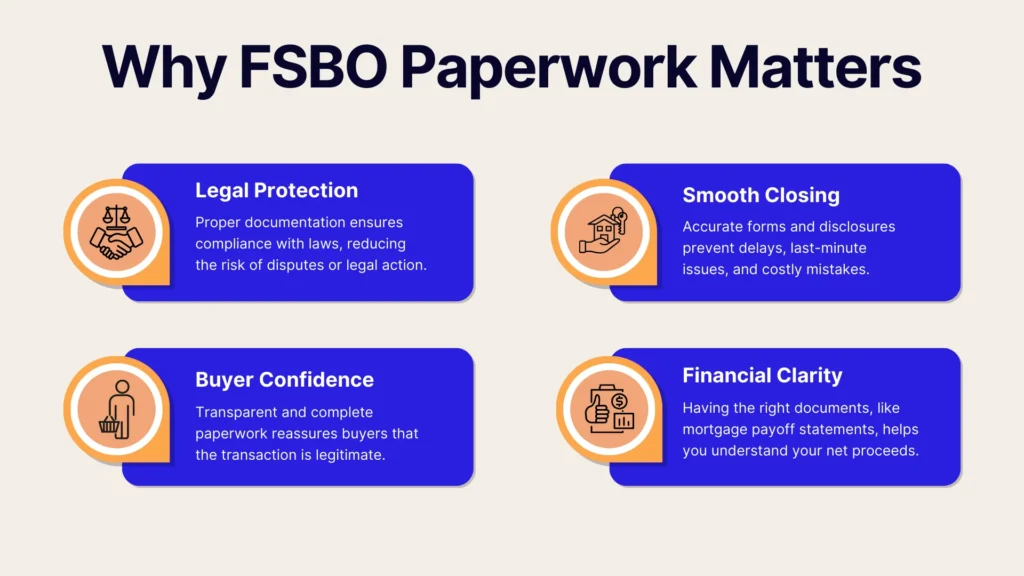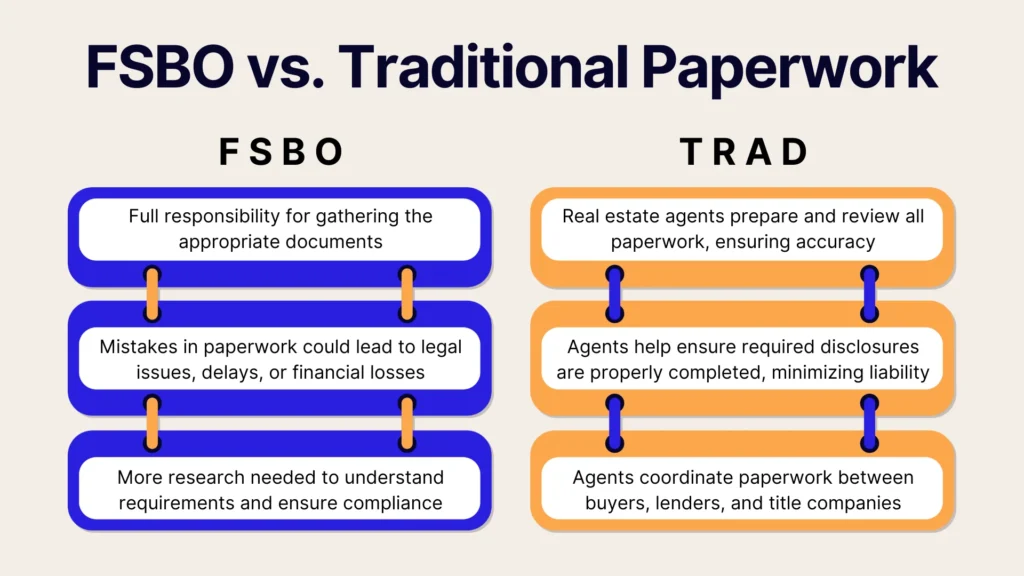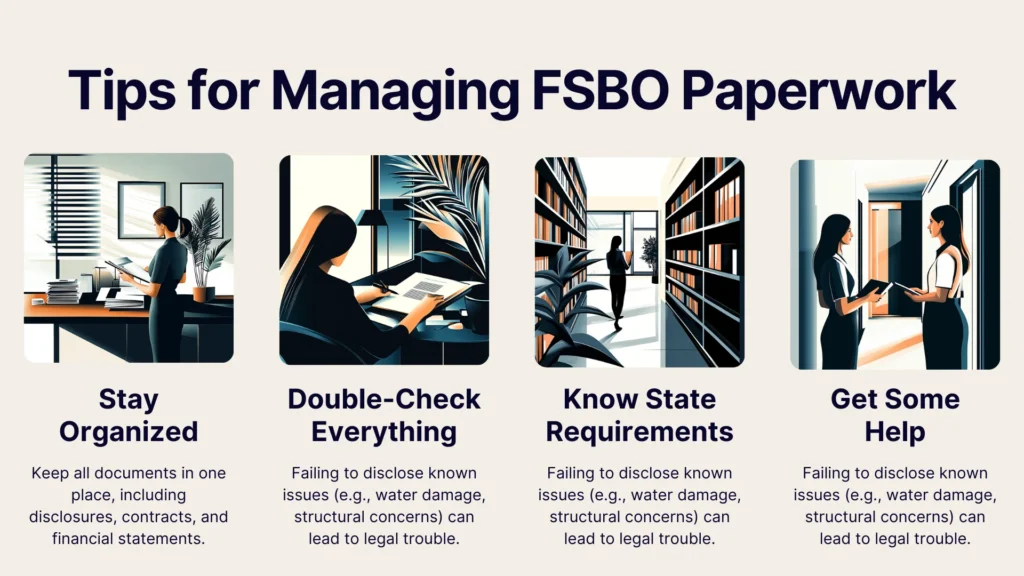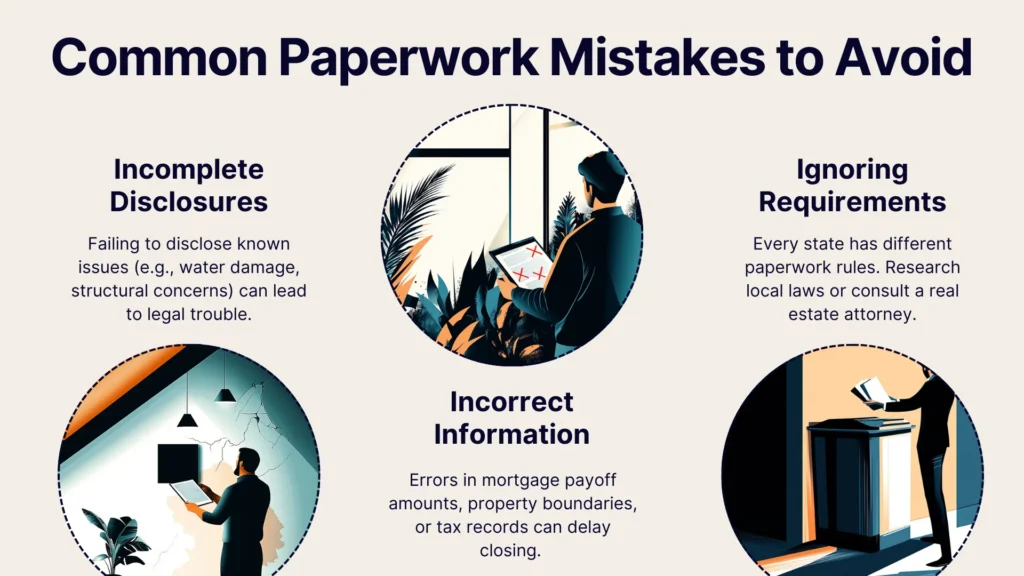Selling your home without a real estate agent can save you thousands, but it also means handling all the details yourself – including the paperwork. From listing documents to closing forms, having the correct paperwork in order is key to a smooth sale and a legal transaction. Keep reading this guide for a simple breakdown of everything you’ll need, so you can confidently sell your home.
Why Paperwork Matters
Selling a home is about finding the right buyer and ensuring everything is legally sound and transparent. The paperwork you handle throughout the process protects you, keeps the deal on track, and gives buyers peace of mind. Here’s why it matters:

- Legal Obligations & Potential Pitfalls: Real estate transactions come with a web of legal requirements, from disclosure forms to contracts. Missing a key document or making an error could lead to delays, fines, or even legal trouble. Proper paperwork ensures you’re covering all your bases and keeping the sale on solid ground.
- Building Trust Through Transparency: FSBO sellers don’t have an agent vouching for them, so earning a buyer’s confidence is crucial. Providing the proper paperwork – especially disclosure statements – shows buyers you have nothing to hide. Transparency helps avoid last-minute surprises and makes buyers more comfortable moving forward with the purchase.
Bottom line? Getting the paperwork right isn’t just a formality. You must promise a smooth, successful, and legally sound home sale.
FSBO vs. Traditional Listing
One of the biggest differences between selling FSBO and listing with an agent is who handles the paperwork. If you’re selling your home on your own, the paperwork burden falls entirely on you, which means understanding your legal obligations is crucial.
Key Differences in Paperwork Responsibilities
- FSBO Sellers: You’re in charge of everything, from drafting the purchase agreement to ensuring all necessary disclosures and contracts are properly completed and signed. This requires a solid understanding of local real estate laws and regulations.
- Traditional Listing: An agent, typically prepares and manages all paperwork for you, ensuring compliance with legal requirements. They’ll also guide you through deadlines and document submissions, reducing the risk of costly mistakes.

Why First-Time Sellers Should Pay Extra Attention
Selling your home as an FSBO seller can be rewarding, but if it’s your first time, there are many potential pitfalls to watch out for. Without the guidance of an experienced real estate agent, it’s easy to overlook crucial details that could impact your sale. Missing a required disclosure, incorrectly filling out a form, or failing to meet a deadline might delay your transaction and lead to legal complications or financial penalties.
First-time FSBO sellers should take extra steps to:
- Research Local Real Estate Laws and Required Documents: Every province or state has its regulations regarding home sales, disclosures, and contract requirements. Understanding these rules upfront can prevent last-minute surprises.
- Consider Hiring a Real Estate Attorney: Even if you’re handling the sale yourself, a real estate lawyer can review your contracts and paperwork to ensure everything is legally sound, protecting you from future disputes.
- Stay Organized: Keeping copies of every document—contracts, disclosures, inspection reports, and correspondence with buyers—will help you stay on top of the process and avoid missing crucial deadlines.
- Be Prepared to Negotiate: Without an agent acting as a buffer, you’ll handle all negotiations yourself. Understanding common buyer requests and knowing when to stand firm or compromise can make a big difference in closing the deal smoothly.
- Understand the Closing Process: From home inspections to title transfers, the final stages of a sale involve multiple steps. Ensuring you meet all requirements promptly will prevent closing delays.
While FSBO can save you money, it also requires more diligence. If you’re new to selling, understanding the paperwork upfront will help you avoid headaches and ensure a smooth, legally compliant transaction.
Core Documents Needed
Selling your home FSBO means having the correct paperwork to keep the process smooth and legally sound. Here are the key documents you’ll need to gather:
Proof of Ownership (The Deed)
Your deed is the official proof that you own the home, and buyers (and their lenders) will need to see it. Double-check that the names and property details match precisely. There are different types of deeds, like warranty deeds, which guarantee a clear title, and quitclaim deeds, which simply transfer ownership without title assurances. Knowing which one applies to your sale is crucial.
Mortgage Statement & Payoff Amount
If you have a mortgage, you’ll need a payoff statement from your lender, showing exactly how much is left to pay. This helps determine how much you’ll walk away with after closing. If there are any liens on the property, you’ll also need to address them before the sale can go through; otherwise, they could delay or even derail the deal.
Homeowners Insurance Records
Your insurance records show your home’s coverage history, which buyers may request to understand past claims or potential risks. If you’ve recently filed damage claims, be prepared to explain what was repaired and if any issues might affect the home’s insurability moving forward.
Property Tax Statements
Buyers (and their lenders) will want to verify that property taxes are updated. Your latest property tax statement confirms this and helps determine prorated taxes at closing, meaning you and the buyer pay your fair share for the time you owned the home during the tax period.

Essential Disclosure Forms
When selling FSBO, you’re legally required to provide buyers with specific disclosures about your home’s condition. These forms protect both you and the buyer by ensuring complete transparency.
Property Condition Disclosure
Most states require sellers to disclose known issues with the home, such as structural problems, past water damage, electrical issues, or pest infestations. Some states have strict disclosure laws, while others follow a "buyer beware" approach. Be sure to check your state’s requirements to avoid legal trouble later.
Lead-Based Paint Disclosure (If Applicable)
If your home was built before 1978, federal law requires you to provide a Lead-Based Paint Disclosure form, informing buyers of any known lead risks. Failing to do so can lead to hefty fines even if you weren’t aware of the presence of lead. Providing the disclosure upfront ensures compliance and avoids legal headaches.
Other Possible Disclosures
Depending on your home and location, additional disclosures may be required. These can include:
- Environmental concerns (radon, asbestos, flood zones)
- HOA rules & fees (if your home is part of a homeowners’ association)
- Past insurance claims that may impact the home’s risk profile
Being upfront about these details keeps your sale legally compliant and helps buyers feel confident in their decision, reducing the chances of last-minute surprises or deal breakers.
Additional FSBO Paperwork
Beyond disclosures and ownership documents, FSBO sellers need the right legal forms to finalize the deal. Here are a few key pieces of paperwork you’ll need to navigate the negotiation and closing process.
FSBO Sales Agreement
This legally binding contract outlines the terms of the sale, including:
- Purchase price
- Contingencies (like financing or inspections)
- Closing date
- Deposit details
A well-drafted agreement ensures both parties are on the same page, reducing the risk of misunderstandings or disputes. Clarity is key; consider having an attorney review it to ensure it’s airtight.
Offer and Counteroffer Documents
When a buyer makes an offer, you must formally accept, reject, or counter in writing. A counteroffer document lays out any changes you want to propose, such as a higher price, adjusted closing date, or different contingencies. A paper trail of negotiations protects you and the buyer and ensures everything is documented clearly.
Common Pitfalls and How to Avoid Them
Selling your home FSBO comes with challenges, as paperwork mistakes can lead to delays or legal issues. Here’s how to sidestep some of the most common pitfalls.

Missing or Incomplete Disclosures
Failing to disclose known issues like past water damage or structural concerns can lead to lawsuits or even allow buyers to back out of the deal. If you realize you’ve left something out, update your disclosure forms immediately to stay compliant. When in doubt, disclose; it’s better to be upfront than to face legal trouble later.
Incorrect or Outdated Information
Errors in paperwork can cause headaches at closing. Double-check your mortgage payoff amount, property boundaries, and tax records to ensure accuracy. If there’s been a name change or title transfer, ensure your documents reflect the correct ownership to prevent delays.
Overlooking State-Specific Requirements
Real estate laws vary by state; a minor paperwork omission can lead to a significant holdup. Some states require specific disclosures, notarized documents, or additional seller forms. To stay on track, check with your local real estate board, county office, or a real estate attorney to ensure you meet all legal requirements.
Conclusion
Selling your home FSBO means handling all the paperwork yourself, but you can navigate the process smoothly with the proper documents and attention to detail. From disclosures to contracts, being thorough and transparent will protect you legally and build buyer confidence, helping you close the deal quickly.
Need a hassle-free way to manage your FSBO paperwork? PropBox simplifies the process with easy-to-use tools for contracts, disclosures, and document organization. Try it today and take the stress out of selling your home!
